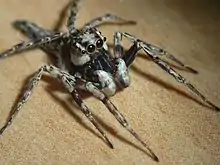Cocalus (spider)
Cocalus is a genus of jumping spiders that was first described by Carl Ludwig Koch in 1846, and is named after Cocalus, a Sicilian king of Greek mythology.[2]
| Cocalus | |
|---|---|
 | |
| Adult male Cocalus | |
| Scientific classification | |
| Domain: | Eukaryota |
| Kingdom: | Animalia |
| Phylum: | Arthropoda |
| Subphylum: | Chelicerata |
| Class: | Arachnida |
| Order: | Araneae |
| Infraorder: | Araneomorphae |
| Family: | Salticidae |
| Subfamily: | Spartaeinae |
| Genus: | Cocalus C. L. Koch, 1846[1] |
| Type species | |
| C. concolor C. L. Koch, 1846 | |
| Species | |
|
6, see text | |
At least one species, Cocalus gibbosus, does not adhere to spider silk and will sometimes invade the webs of other spiders and stalk across the webs to feed on them,[3] preferring spiders over insects in its diet.[4] However, unlike other araneophagic jumping spiders like Portia, Cocalus gibbosus does not pluck on the webs of other spiders.[3]
Species
As of June 2019 it contains six species, found only in Asia, Australia, and Papua New Guinea:[1]
- Cocalus concolor C. L. Koch, 1846 (type) – Indonesia, New Guinea
- Cocalus gibbosus Wanless, 1981 – Australia (Queensland)
- Cocalus lacinia Sudhin, Nafin, Sumesh & Sudhikumar, 2019 – India
- Cocalus limbatus Thorell, 1878 – Indonesia
- Cocalus menglaensis Cao & Li, 2016 – China
- Cocalus murinus Simon, 1899 – India, Indonesia, Singapore (Sumatra)
References
- "Gen. Cocalus C. L. Koch, 1846". World Spider Catalog Version 20.0. Natural History Museum Bern. 2019. doi:10.24436/2. Retrieved 2019-07-06.
- Koch, C. L. (1846). Die Arachniden.
- Jackson, Robert R. (1990-10-01). "Predatory and nesting behaviour of Cocalus gibbosus, a spartaeine jumping spider (Araneae: Salticidae) from Queensland". New Zealand Journal of Zoology. 17 (4): 483–490. doi:10.1080/03014223.1990.10422947. ISSN 0301-4223.
- Jackson, Robert R. (2000-01-01). "Prey preferences and visual discrimination ability of Brettus, Cocalus and Cyrba, araneophagic jumping spiders (Araneae: Salticidae) from Australia, Kenya and Sri Lanka". New Zealand Journal of Zoology. 27 (1): 29–39. doi:10.1080/03014223.2000.9518206. ISSN 0301-4223.
This article is issued from Wikipedia. The text is licensed under Creative Commons - Attribution - Sharealike. Additional terms may apply for the media files.